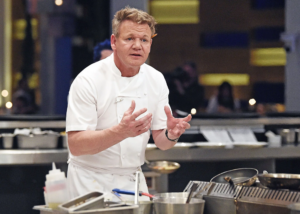
Gordon Ramsay’s Attempt to Make Puerto Rican Pegao Sparks Debate Over Authenticity
Gordon Ramsay isn’t known for his sensitivity — in fact, quite the opposite: He’s built a reputation on insulting amateur home cooks and berating professional chefs. Usually, audiences find that abrasive side of his personality refreshing (or least entertaining) as he cooks dishes from around the world. Yet even when he’s agreeable, his cooking can rub people the wrong way. Most recently, Ramsay is facing criticism after he attempted to prepare pegao, a Puerto Rican fried rice dish.
In a recent video posted to the chef’s YouTube channel titled “Can Gordon Ramsay Make a Puerto Rican Crispy Rice Dish?” Ramsay greets viewers from Puerto Rico, which he calls one of the most “incredible islands I’ve had a chance to visit.” He says the dish is a “staple,” and “nothing fancy,” but his tone isn’t dismissive or condescending. He clearly admires the dish and is excited about recreating it.
Still, some chefs took issue with Ramsay’s approach to pegao. On Twitter, a Puerto Rican chef named Reina, who goes by @thesofritoproject, wrote, “This isn’t pegao,” and pointed out that, “It’s just frustrating to see white male chefs get applauded for doing the bare minimum (and incorrectly, for that matter) about cuisines they know nothing about and then get heralded as experts.”
Though Ramsay’s final dish certainly looks appetizing, the video found many detractors who agreed with Reina’s objections to his version of pegao. One user pointed out that pegao refers to a very specific type of rice, tweeting, “Don’t get me wrong, this looks great and all. But what we typically refer to as ‘pegao’ refers to the rice that sticks to the bottom of the pan while cooking, which gets all crispy and sticky.”

Another person on Twitter was a bit more blunt in his opinion of the dish: “This is it not what you’re saying it is. – Every Puerto Rican that has ever existed.”
It’s not the first time Ramsay has found himself in hot water regarding recipes from cultures other than his own. Back in 2019, his London restaurant Lucky was at the center of a debate over cultural appropriation, with critics claiming that the menu treated pan-Asian cuisine as a monolith with interchangeable dishes.
There were some people who were more receptive to Ramsay’s interpretation of pegao, however. On Youtube, a commenter wrote, “The Puerto Rican delegation has accepted Gordon’s Ramsey’s application for Boricua citizenship.”
Reina isn’t alone in commenting that white male celebrity chefs often get praised for popularizing cuisines that have been cooked by historically underrepresented people for generations. It’s an idea that’s widespread within the food and restaurant world — and it’s one that many chefs are just starting to grapple with. It’s always worth questioning how some chefs market and take credit for dishes outside their own culture.

While Ramsay’s intentions might have been to celebrate and honor Puerto Rican flavors, the issue many of his critics have is that he chose to call his dish pegao. That dish has a very specific definition, and he chose to reinterpret pegao in favor of his own culinary whims. It seems that he simply got his facts wrong: In a Twitter thread, Seattle-based chef Eric Rivera wrote that “you wouldn’t use a cast-iron pan” to make pegao. “You would use a caldero made of aluminum if it is a classic preparation. Adding butter wouldn’t be a thing,” he added.
He boils down the problem with Ramsay’s attempt to cook pegao by writing that, “You’re showing people the wrong name of the dish, the wrong technique.” The solution Rivera suggests instead is to next time, “Get a Puerto Rican person to get on camera and sit back, let them do the talking, and cooking. Learn, cook it many times, then think about a video with the original Puerto Rican to show your progress.”
There isn’t necessarily anything inherently wrong with adapting dishes from other cultures to a chef’s specific tastes. But when white chefs call their interpretation of a marginalized culture’s dish by the wrong name, it’s easy to see why plenty of people would feel like that’s erasure of their own beloved culture and traditions.
